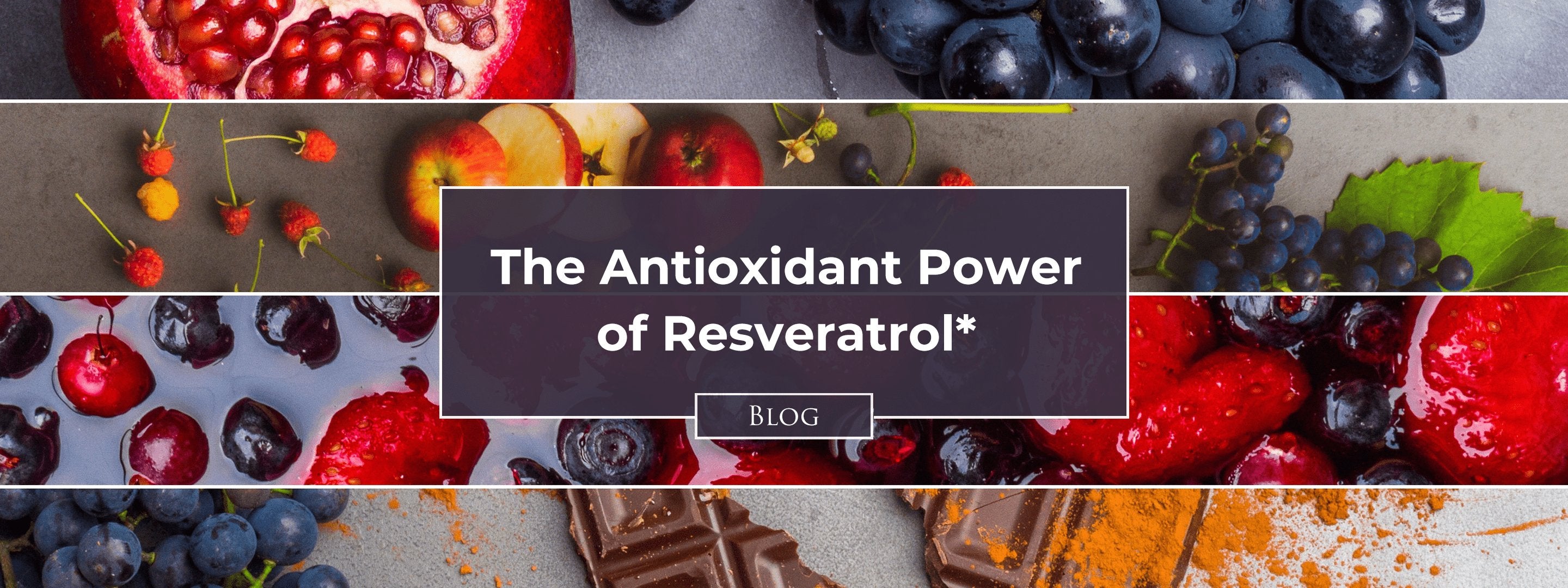

The “French Paradox” is a conundrum that has puzzled health researchers for many years. With a diet that’s heavy on carbohydrates, fat and wine, French people have significantly lower rates of brain and cardiovascular health issues compared to Americans. It's believed that one possible factor contributing to this phenomenon is the French habit of drinking red wine with dinner. Red wine is one of many fermented foods that has tremendous health benefits. Red wine is the most concentrated food source of the powerful antioxidant resveratrol.
What is Resveratrol?

Resveratrol is a polyphenol found in over 70 different types of plants. It is most associated with grapes which have high amounts of this antioxidant. Resveratrol plays a role in certain plant species not unlike our own immune system.* Plants produce this polyphenol when attacked by harmful bacteria or fungi. This specific type of polyphenol is called a phytoalexin, of which there are many different kinds in the plant world. Essentially, resveratrol is a natural defense mechanism for plant life that helps it survive various pathogens.
Benefits of Resveratrol

When we consume resveratrol just what effect does it have on our body? Resveratrol triggers our cell-cleaning cycle called autophagy which gets rid of damaged cellular debris.* Usually we enter a phase of autophagy between meals or when fasting, but resveratrol can stimulate this state without caloric restriction.* Resveratrol may support DNA repair by keeping the protective ends of DNA strands, called telomeres, intact for longer periods of time.* When we are young, DNA telomeres are long and gradually become shorter with age.* Shortened telomeres have also been observed in individuals with severe chronic health problems. Resveratrol has general benefits for cardiovascular health since its antioxidant capabilities promote good circulation and flexible blood vessels.* For the brain, resveratrol can guard against the accumulation of plaques that are related to cognitive decline.*
How Much Resveratrol Should I Take?

In the majority of studies and clinical trials a dosage between 250 mg and 500 mg was seen as safe. Our Resveratrol Ultra formula contains 250 mg per one capsule serving along with other ingredients that support the body against oxidative stress such as green tea extract, red wine extract and grape seed extract.
Nutritional Elements of Wine and Grapes

We included grape seed extract and red wine extract in our resveratrol formula to closely mimic the nutrients you receive when you drink a glass of wine, but without the alcohol, sugar and calories. While resveratrol is the most famous flavonoid present in red wine, red wine is full of numerous diverse polyphenols and flavonoids. Red wine extract provides a variety of healthy anti-inflammatory antioxidants that work synergistically with resveratrol. Grape seed extract is also a rich source of resveratrol and proanthocyanidins, another type of polyphenol. Studies show grape seed extract can cross the blood-brain barrier providing cognitive health benefits. It may support healthy cholesterol levels as well. You can find the heart and brain health benefits of resveratrol, red wine extract and grape seed extract in our Resveratrol Ultra complex.
Restore with resveratrol and shop Nature's Lab Resveratrol Ultra today!
References
Zhen, J., Qu, Z., Fang, H., Fu, L., Wu, Y., Wang, H., Zang, H., Wang, W. (2014, August 1). Effects of grape seed proanthocyanidin extract on pentylenetetrazole-induced kindling and associated cognitive impairment in rats. International Journal of Molecular Medicine. Retrieved September 6, 2022, from https://www.spandidos-publications.com/10.3892/ijmm.2014.1796
Salehi, B., Mishra, A. P., Nigam, M., Sener, B., Kilic, M., Sharifi-Rad, M., Fokou, P. V. T., Martins, N., Sharifi-Rad, J. (2018, September 9). Resveratrol: A double-edged sword in health benefits. Biomedicines. Retrieved September 6, 2022, from https://www.ncbi.nlm.nih.gov/pmc/articles/PMC6164842/
Todd, L. (2021, July 28). Resveratrol benefits, dosage, and more. Medical News Today. Retrieved September 6, 2022, from https://www.medicalnewstoday.com/articles/resveratrol-benefits
Ramírez-Garza, S. L., Laveriano-Santos, E. P., Marhuenda-Muñoz, M., Storniolo, C. E., Tresserra-Rimbau, A., Vallverdú-Queralt, A., Lamuela-Raventós, R. M. (2018, December 3). Health effects of resveratrol: Results from human intervention trials. Nutrients. Retrieved September 6, 2022, from https://www.ncbi.nlm.nih.gov/pmc/articles/PMC6317057/
Anitha , A., Thanseem I, I., Viswambharan, V., Vasu, M. M., Poovathinal, S. A. (2019, February 21). Telomeres in neurological disorders. Advances in clinical chemistry. Retrieved September 6, 2022, from https://pubmed.ncbi.nlm.nih.gov/31122612/




